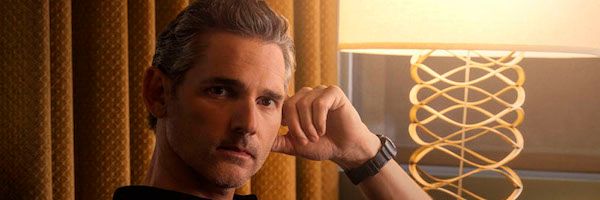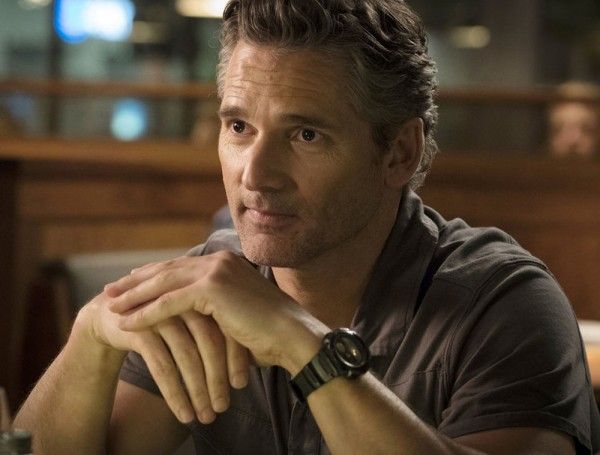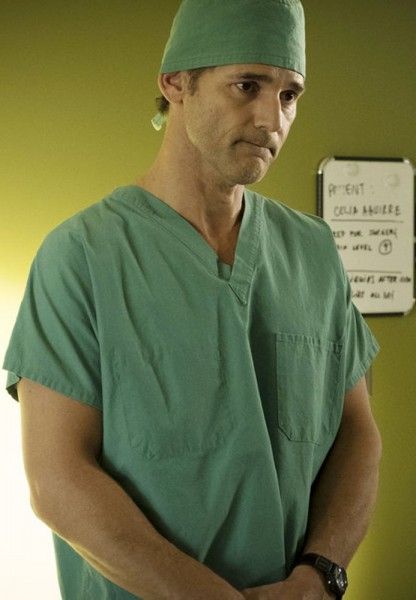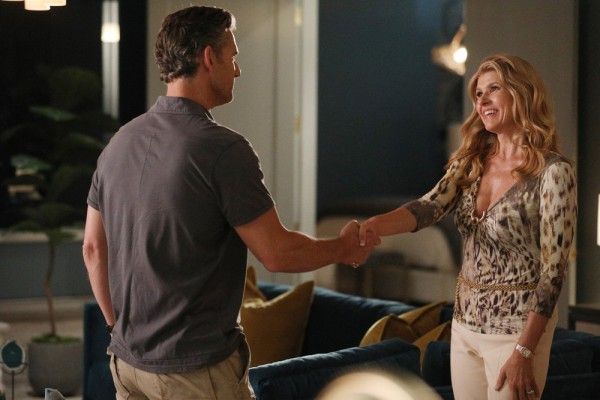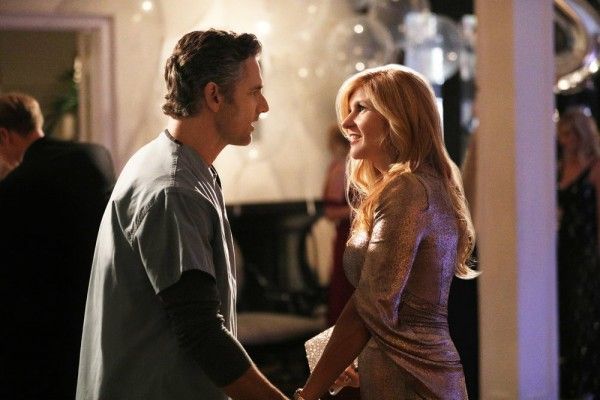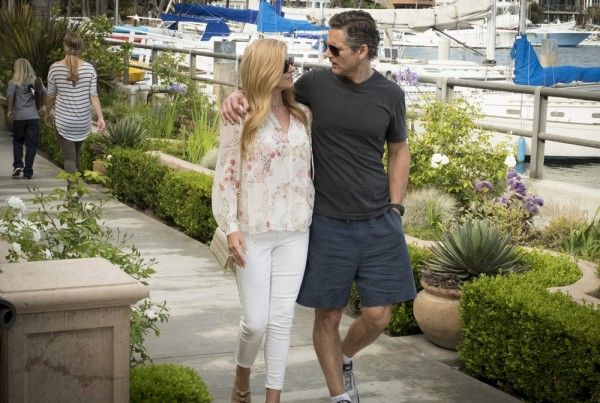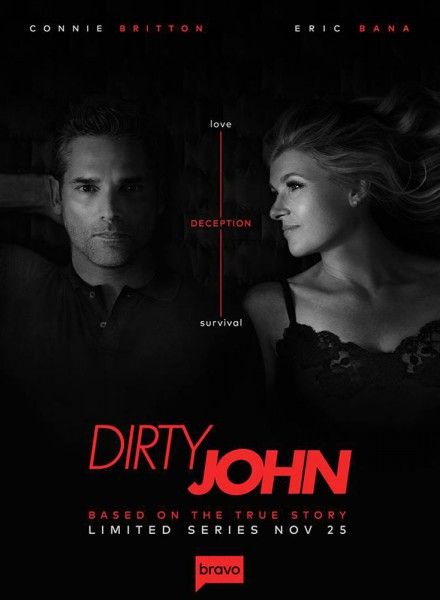Based on the articles and true crime podcast from Los Angeles Times reporter Christopher Goffard, the Bravo series Dirty John tells the true story of how the romance between Debra Newell (Connie Britton) and John Meehan (Eric Bana) became one of secrets and manipulation. As Debra’s two daughters, Veronica (Juno Temple) and Terra (Julia Garner), begin to question John’s motives and investigate the man that’s stolen their mother’s heart, what once seemed like an idyllic love story evolves into a family’s fight for survival.
During this 1-on-1 phone interview with Collider, actor Eric Bana talked about the appeal of a limited series format, playing a sociopathic character, having Connie Britton as a collaborative partner, the biggest challenges in playing John Meehan, why he likes to take his time between projects, and whether he’d consider doing another TV project in the future.
Collider: It’s interesting that TV seems to really be playing with this idea of the great love story. There’s a show on Lifetime, called You, that’s about a guy who stalks a woman, in person and online, to make himself into her perfect boyfriend, and now we have this show, Dirty John, about a guy that’s clearly not who he represents himself to be. Do you think that guys like this, who represent themselves as something they’re not or try to become whatever fits in the moment, are more common than we realize they are?
BANA: I guess it depends on to what degree. I’m sure that shape-shifting sociopathic behavior expresses itself in everything from very low levels to its extreme and most dangerous form. I’m sure a lot of people find themselves doing versions of that behavior. It’s the extremeness that’s compelling and disturbing.
With John, it’s so creepy and unsettling because he just seems like this totally normal, nice guy, until he’s not.
BANA: Right. From that perspective of feeling uncomfortable, it just gets worse and worse, as we go. We culminate at around Episode 7, in terms of revealing exactly what is and has been going on, in the background of the stuff that we’ve already experienced, in present tense, in other episodes. It was very interesting to do because there were also plenty of things that we were tracking, as we were doing it. We filmed most of the series in chronological order, except for the first three episodes We shot those in a block. So, once we got out of that block of three episodes, it became a lot easier to track and regulate some of that behavior, for Episodes 4, 5, 6, 7 and 8. And (showrunner) Alexandra [Cunningham], Jeff [Reiner], the director, and I, really enjoyed that part of it, just that notion of how much of John are we showing for the characters that are in the scene, and how much of John are we showing to the audience to pick up on things inside of the moments.
Things get even scarier when you get some of John’s history and realize just how long he’s been doing all of this for. Did you look for answers or reasons, with someone like him? Do you feel like you have to find a way to come to an understanding for the character that you’re playing, or do you not worry about doing that?
BANA: It’s a bit of everything. I think it’s a natural instinct, as an actor, writer or director, to try to come up with some of those answers. We came to a place, early on, where we realized that it was a bit of a waste of time to try to come up with answers and motivations. I came to the conclusion that a large part of it was just to do with always having a plate spinning, and always having the need to wreak havoc and lie, and the need to keep shifting and pivoting. That was his basic make-up. The reasons for that are way too complicated for even a therapist to unpack. I just want to be convincing in getting people to feel like I’m believable as that kind of person. That was my job, rather than trying to diagnose his condition. I just really concentrated on trying to make him as believable as possible, in the doing all of those things. I felt like that was a more interesting pathway. But there were plenty of times where Jeff and I would sit on set and he’d say, “Why is he doing this?” And the answer would always come back to, “Because this is what he does.”
You’ve said that you’ve looked at a lot of TV projects, over the years, but that it really took you reading this script to say yes. Did you ever come close to doing any of those previous projects, or was it always just an automatic no, for whatever reason?
BANA: A lot of them were an automatic no because they were actual series. It got more tempting when they started to come into the limited series space. And then, this one came along and I just really wanted to do it. I’m a bit of a commitment-phobe, so I liked the limited series model. It didn’t feel any different to a movie for me, in terms of the way you go about it.
Had you been familiar with the podcast this series is based on, or did you listen to it, as you were preparing for it?
BANA: That was part of the pitch for the actual project, so I had to listen to it before I could even have a creative conversation. I wanted to know where it was coming from. I just see it as podcast is the new book, in terms of how material gets optioned and valued, and whether there’s potential commercial interest. I think it is quite an easy leap for a lot of producers and studios and executives to make. If a podcast has a big following, maybe there’s potential there. It’s never a guarantee, but I do think there’s something about this storyline that is almost like a horror movie. If it’s a very primal thing, it appeals to people’s egos, in the sense that they think, “This couldn’t possibly happen to me!,” because they think that they would be a better judge of human character.
How many scripts were you given to read before shooting this? Did you have all of them, or were they still being written, as you were shooting it?
BANA: They were still being written, so I met with Alexandra, the head writer, Jeff, Connie and Richard Suckle, the producer, and then I just jumped on board. Connie and I are also executive producers, so there was some level of comfort in that, in terms of the whole process, but ultimately it was a leap of faith for all of us. For it to happen, we all needed to jump in, and that meant jumping in before there were finalized scripts. The outline was very detailed, and she went into great detail, on each of the eight. Ultimately, we had faith in her and the writers.
What was it like to have Connie Britton, as a partner in all of this?
BANA: It was fantastic! She’s really smart, and she’s got incredibly great instincts, as an actress. She’s just a wonderful person, so it was a really good partnership. I loved working with her. It gave me good peace of mind. We both felt fairly strongly, on many points, so it always felt like we were heading in the same direction, or trying to achieve the same goal, which was nice.
Did you also have conversations about how far you could go with her, especially when things get more intense, or did that all feel pretty instinctual?
BANA: It was very instinctual on set. We would break down scenes pretty aggressively if we felt like they were going too far in one direction or not far enough in another. Having Alex on the set, all the time, made it very easy for us to have those conversations or to try different things, and Jeff was great at being experimental and trying one idea out and then another, on the spot. We really went with our instincts, on the day, in terms of how things were working or not working. Having someone like Connie, who is instinctual and happy to go with others’ instincts and try things, was great.
Obviously, you don’t want to go too deep into the mind of a guy like this, otherwise it seems like it could just be an endless deep dive into that. But did you try to figure out what aspects of him might actually have been who he really was?
BANA: It was interesting. I guess the most challenging element of that, for me, was working out the real attraction between him and Debra. I came to the conclusion, pretty early, that the attraction was very real, and that had he not have been predisposed to having that kind of personality, the relationship would have been a great one for him. But with him being always on the take, so to speak, meant that this relationship was as doomed as all of the others. I think it’s even hard for the real Debra to work out what was real and what wasn’t, when you go back and track the relationship. I think the reality is that he’s the most real when he’s at his worst.
Which is the scariest part. Debra also has two daughters, who you have some really interesting scenes with. What was it like to work with Juno Temple and Julia Garner, and explore the more contentious side of things with them?
BANA: That was fun. I just wish I had a lot more with them. It’s a combination of both challenging and very funny. They’re great characters, and Juno does such a fantastic job. I had quite a few more scenes with Julia, and then we changed the structure of a couple of the episodes and I ended up with a lot less with her than I was originally going to have, which is a bummer. But, they were both fantastic. They’re so uniquely different, in the way that they present to Debra and their perspectives. I think they did a wonderful job. They’re a couple of sweethearts, too.
His behavior with each of them is interesting because they approach him very differently, but they’re both still a threat to him.
BANA: Yeah. Veronica is the more obvious threat, for sure. I love that scene in the kitchen, early on, when I’m trying to get her to come outside and have a chat, and she’s not having any of it, in front of Debra. That was fun.
Do you have any idea what’s next for you, as an actor?
BANA: Not 100%, which is not unusual. I don’t usually know what I’m doing until well after I’ve finished something. I tend not to rack them up.
Do you just like to take breaks, in between, to recharge?
BANA: Most definitely, yeah. It’s not that hard to do, in the last however many years, because finding the scripts that you want to work on keeps getting harder and harder, particularly in the film space, as those kinds of movies are less in number. So, I’m always happy to wait. I never get that panic. I might get a sense of frustration, but I don’t tend to panic.
Now that you’ve had this experience on a TV project, would you consider doing it again, especially if it were something with a different kind of structure like this has?
BANA: Yeah. I really like the limited series framework because I think it’s just a more detailed way of breaking down a story and exploring a character. For sure, I’d be open to it again. I don’t know if I could ever do a series, but a limited series definitely has a lot appeal. I never say never. One of the reasons that a series was never really an option to me was because we live in Australia and are raising two kids, one of which is already at university and the other one’s only got two years left. That changes your circumstances a bit.
Dirty John airs on Sunday nights on Bravo.

